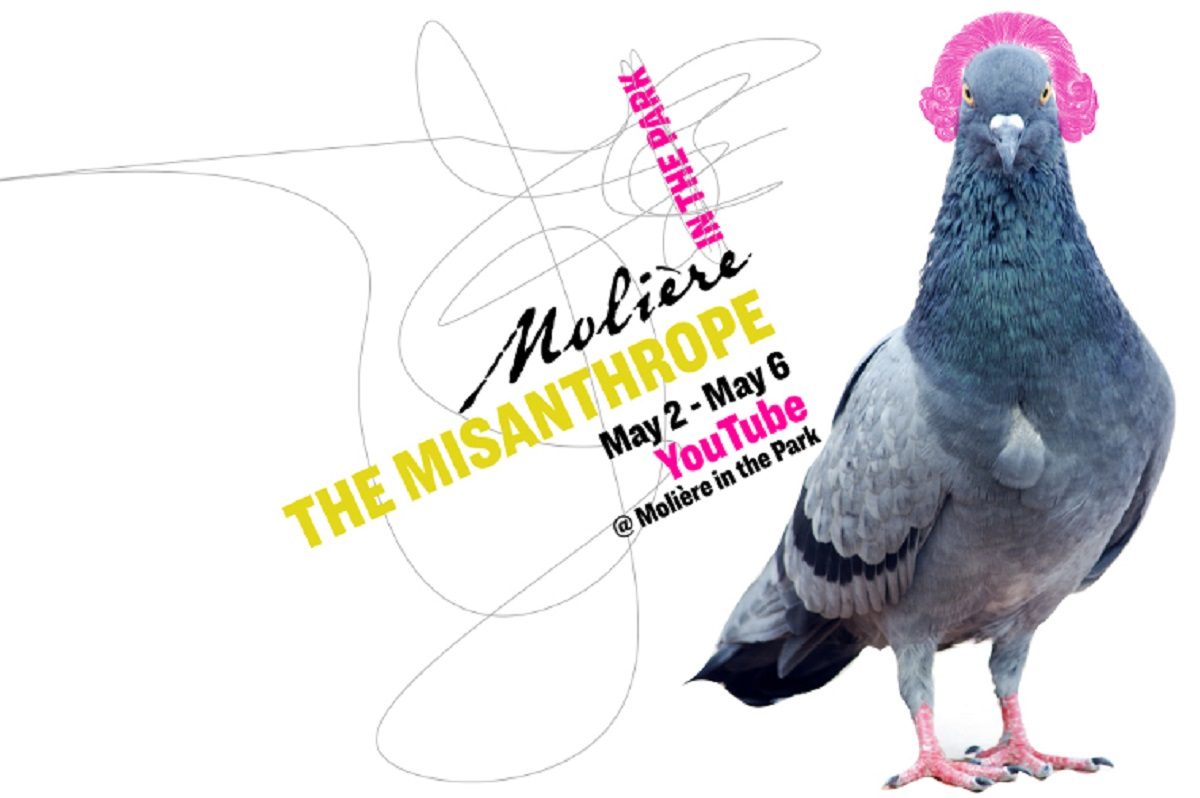
The Misanthrope
Written by Molière; translated by Richard Wilbur
Directed by Lucie Tiberghien
Presented by the French Institute Alliance Française (FIAF) in partnership with the Prospect Park Alliance
May 2-6, 2020 on Molière in the Park's YouTube Channel
It's not hard to imagine an anthology of plays written specifically for performance via Zoom or its equivalents coming out of the current pandemic. At the same time, however, we are seeing theater companies and organizations working to present traditional and classical works in new formats. One of these groups is Molière in the Park, which is dedicated to presenting free performances of the French playwright's corpus to audiences in Brooklyn's Prospect Park. On May 2, Molière in the Park presented a performance of The Misanthrope that was livestreamed via the group's YouTube channel and will be available for free through May 6. This production of the satirical comedy, which made its stage debut in 1666, assembled the cast (most of whom were in various parts of New York but some of whom logged in from as far away as Los Angeles and Perugia, Italy) via Zoom, making clever use of backgrounds and eyelines to create the illusion of the actors sharing a space in some scenes and to emphasize their isolation in others. The production also featured a live chat in the comments for those watching through a browser or the Youtube app (as opposed to casting the stream to a TV). The cast delivered a lively and funny performance, while almost exclusively seated and not necessarily able to see one another no less, and watching it live imparted some of that sense of community that live theater creates so well.
The misanthrope of the title is Alceste (Jared McNeill), a Timon of Athens type who professes a radical honesty and rails against what he perceives as the hypocrisy and degeneracy of his times. Célimène (Jennifer Mudge), despite her embrace of the mores and manners against which Alceste sets himself, is the object of his affections. His rivals in this include Oronte (Chris Henry Coffey), whose sonnet-writing skills Alceste insults after trying first (hypocritically?) to pillory the poem indirectly, leading Oronte to try to have him arrested. Célimène's own rivals in affection include the prudish Arsinoé (Heidi Armbruster) and Éliante (Kaliswa Brewster), for whom Alceste's friend Philinte (Postell Pringle) has feelings. The machinations among these would-be lovers, along with two additional marquises, played by Naomi Lorrain and Tamara Sevunts, furnish targets for Molière's social satire while propelling the plot towards a final set of choices that the central characters must make.
Each act is briefly introduced by Samira Wiley, who also has a small part in the play proper, and singer-songwriter Stew provides a musical interlude between Acts 3 and 4. The language of the play is rhyming couplets (in this, it is reminiscent of much English verse of the long 18th century), but this adaptation also introduces some nods to its setting in contemporary Brooklyn: in the opening of the play, for example, Alceste takes off his headphones when he says he will be deaf to Philinte; and references are made to marquises having "joined the call" and to waiting until someone's Uber arrives. Aside from allusions to the atypical performance method, the production made some good use of its possibilities, with, for instance, eye-catching visual design in Act 2 that complemented the color of something that each character onscreen was wearing with different bold white-and-single-color wallpaper in that character's background. Act 5 features the effective symbolism of one Zoom window at a time disappearing as characters find out exactly what Célimène really thinks of them, and an earlier moment when Alceste feels himself betrayed receives notable emphasis just by McNeill moving around within the frame. McNeill makes for a charmingly irascible Alceste among this strong cast, with other standout moments including Coffey's very funny extended lead-in to reading Oronte's sonnet out loud and Armbruster's comprehensively hilarious turn as Arsinoé.
Following a Zoom curtain call was a Q&A generated by the comments. Audience members asked about the interpretation of Alceste, how the streaming format affected different elements of the production (one person asked whether directing it was more like directing a film, but live TV might be a better comparison), and upcoming productions, which will include Tartuffe. It is interesting to think about how the challenges for the actors, such as a lack of physical interaction, reflect our own everyday difficulties right now (there have been multiple recent articles about the illusion of connection in virtual meetings, for example -- the difficulties of having only the appearance of eye contact and lacking the typically unnoticed physical cues and rhythms of in-person conversation). What's great about The Misanthrope, though, is that you won't be thinking about any of this for 90-plus minutes, so check it out before, like an in-person performance, it disappears forever. - Leah Richards & John Ziegler
